Related Research Articles

Pope Alexander VIII, born Pietro Vito Ottoboni, was head of the Catholic Church and ruler of the Papal States from 6 October 1689 to his death in 1691. He is to date the last pope to take the pontifical name of "Alexander" upon his election to the papacy.
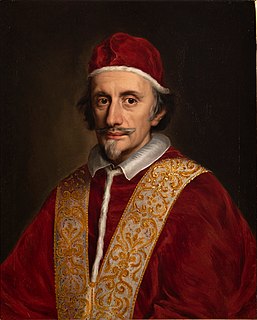
Pope Innocent XI, born Benedetto Odescalchi, was head of the Catholic Church and ruler of the Papal States from 21 September 1676 to his death on August 12, 1689.

Ultramontanism is a clerical political conception within the Catholic Church that places strong emphasis on the prerogatives and powers of the Pope. It contrasts with Gallicanism, the belief that popular civil authority—often represented by the monarch's or state's authority—over the Church is comparable to that of the Pope.

Pope Pius VI was head of the Catholic Church and ruler of the Papal States from 15 February 1775 to his death in 1799.
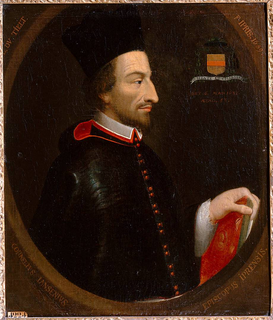
Jansenism was an early modern theological movement within Catholicism, primarily active in the Kingdom of France, that emphasized original sin, human depravity, the necessity of divine grace, and predestination. It was declared a heresy by the Catholic Church.

The Concordat of 1801 was an agreement between Napoleon Bonaparte and Pope Pius VII, signed on 15 July 1801 in Paris. It remained in effect until 1905, except in Alsace-Lorraine, where it remains in force. It sought national reconciliation between revolutionaries and Catholics and solidified the Roman Catholic Church as the majority church of France, with most of its civil status restored. This resolved the hostility of devout French Catholics against the revolutionary state. It did not restore the vast church lands and endowments that had been seized upon during the revolution and sold off. Catholic clergy returned from exile, or from hiding, and resumed their traditional positions in their traditional churches. Very few parishes continued to employ the priests who had accepted the Civil Constitution of the Clergy of the Revolutionary regime. While the Concordat restored much power to the papacy, the balance of church-state relations tilted firmly in Napoleon's favour. He selected the bishops and supervised church finances.

Félicité Robert de La Mennais was a French Catholic priest, philosopher and political theorist. He was one of the most influential intellectuals of Restoration France. Lamennais is considered the forerunner of liberal Catholicism and social Catholicism.
The Pragmatic Sanction of Bourges, issued by King Charles VII of France, on 7 July 1438, required a General Church Council, with authority superior to that of the papacy, to be held every ten years, required election rather than appointment to ecclesiastical offices, prohibited the pope from bestowing and profiting from benefices, and forbade appeals to the Roman Curia from places further than two days' journey from Rome. The Pragmatic Sanction further stipulated that interdict could not be placed on cities unless the entire community was culpable. The king accepted many of the decrees of the Council of Basel without endorsing its efforts to coerce Pope Eugene IV.
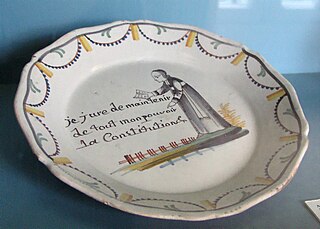
The Civil Constitution of the Clergy was a law passed on 12 July 1790 during the French Revolution, that caused the immediate subordination of the Catholic Church in France to the French government.
Gallicanism is the belief that popular civil authority—often represented by the monarch's or the state's authority—over the Catholic Church is comparable to that of the Pope. Gallicanism is a rejection of ultramontanism; it has something in common with Anglicanism, but is nuanced, in that it plays down the authority of the Pope in church without denying that there are some authoritative elements to the office associated with being primus inter pares. Other terms for the same or similar doctrines include Erastianism, Febronianism, and Josephinism.

Febronianism was a powerful movement within the Roman Catholic Church in Germany, in the latter part of the 18th century, directed towards the nationalizing of Catholicism, the restriction of the power of the papacy in favor of that of the episcopate, and the reunion of the dissident Churches with Catholic Christendom. It was thus, in its main tendencies, the equivalent of what in France is known as Gallicanism. Friedrich Lauchert describes Febronianism, in the Catholic Encyclopedia, as a politico-ecclesiastical system with an ostensible purpose to facilitate the reconciliation of the Protestant bodies with the Catholic Church by diminishing the power of the Holy See.

Papal supremacy is the doctrine of the Catholic Church that the Pope, by reason of his office as Vicar of Christ, the visible source and foundation of the unity both of the bishops and of the whole company of the faithful, and as pastor of the entire Catholic Church, has full, supreme, and universal power over the whole church, a power which he can always exercise unhindered: that, in brief, "the Pope enjoys, by divine institution, supreme, full, immediate, and universal power in the care of souls."
Charles-Maurice Le Tellier was a French Archbishop of Reims.
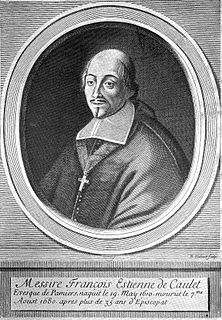
François-Étienne Caulet was a French bishop and Jansenist.
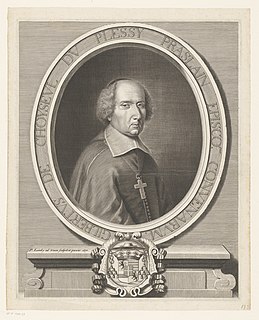
Gilbert Choiseul du Plessis-Praslin was a French bishop.
Jura regalia is a medieval legal term which denoted rights that belonged exclusively to the king, either as essential to his sovereignty, such as royal authority; or accidental, such as hunting, fishing and mining rights. Many sovereigns in the Middle Ages and in later times claimed the right to seize the revenues of vacant episcopal sees or abbeys, claiming a regalian right. In some countries, especially in France where it was known as droit de régale, jura regalia came to be applied almost exclusively to that assumed right. A liberty was an area where the regalian right did not apply.

Vineam Domini Sabaoth is an apostolic constitution in the form of a papal bull promulgated by Pope Clement XI in 1705 which declared that "obediential silence" is not a satisfactory response to the Formula of Submission for the Jansenists.
The assembly of the French clergy was in its origins a representative meeting of the Catholic clergy of France, held every five years, for the purpose of apportioning the financial burdens laid upon the clergy of the French Catholic Church by the kings of France. Meeting from 1560 to 1789, the Assemblies ensured to the clergy an autonomous financial administration, by which they defended themselves against taxation.
Celestino Sfondrati was an Italian Benedictine theologian, Prince-abbot of St. Gall and Cardinal.

Inter multiplices pastoralis officii is an apostolic constitution in the form of a papal bull promulgated by Pope Alexander VIII in 1690, and published in 1691. This decree reversed previous pronouncements by the French Catholic Church.
References
- Aubenas, Roger J. (2008) [1957]. "The Papacy and the Catholic Church". In Potter, George R. (ed.). The new Cambridge modern history. Vol. 1. Cambridge: Cambridge University Press. pp. 85–86. doi:10.1017/CHOL9780521045414.007. ISBN 9781139055765 – via Cambridge Histories Online.
- Costigan, Richard F. (2005). The consensus of the church and papal infallibility : a study in the background of Vatican I. Washington, DC: The Catholic University of America Press. doi:10.2307/j.ctt285016. ISBN 9780813214139. JSTOR j.ctt285016.
 One or more of the preceding sentences incorporates text from a publication now in the public domain: Dégert, Antoine (1909). "Gallicanism". In Herbermann, Charles (ed.). Catholic Encyclopedia . Vol. 6. New York: Robert Appleton Company.
One or more of the preceding sentences incorporates text from a publication now in the public domain: Dégert, Antoine (1909). "Gallicanism". In Herbermann, Charles (ed.). Catholic Encyclopedia . Vol. 6. New York: Robert Appleton Company.- Denzinger, Heinrich; Hünermann, Peter; et al., eds. (2012). "Compendium of Creeds, Definitions, and Declarations on Matters of Faith and Morals". Enchiridion symbolorum: a compendium of creeds, definitions and declarations of the Catholic Church (43rd ed.). San Francisco: Ignatius Press. ISBN 978-0898707465.
- Ehler, Sidney Z.; Morrall, John B., eds. (1967) [1954]. "Declaration of the Gallican clergy, March 19, 1682". Church and state through the centuries : a collection of historic documents with commentaries. New York: Biblo and Tannen. pp. 205–208. ISBN 0-8196-0189-6. OCLC 871265970.
 One or more of the preceding sentences incorporates text from this source, which is in the public domain :Jervis, W. Henley (1872). The Gallican church : a history of the church of France, from the Concordat of Bologna, A.D. 1516, to the revolution. Vol. 1. London: John Murray. p. 14. hdl:2027/uc2.ark:/13960/t3tt4jc2c. OCLC 648585351.
One or more of the preceding sentences incorporates text from this source, which is in the public domain :Jervis, W. Henley (1872). The Gallican church : a history of the church of France, from the Concordat of Bologna, A.D. 1516, to the revolution. Vol. 1. London: John Murray. p. 14. hdl:2027/uc2.ark:/13960/t3tt4jc2c. OCLC 648585351. One or more of the preceding sentences incorporates text from this source, which is in the public domain :Jervis, W. Henley (1872). The Gallican church : a history of the church of France, from the Concordat of Bologna, A.D. 1516, to the revolution. Vol. 2. London: John Murray. pp. 23–59. hdl:2027/hvd.32044019558410. OCLC 648585351.
One or more of the preceding sentences incorporates text from this source, which is in the public domain :Jervis, W. Henley (1872). The Gallican church : a history of the church of France, from the Concordat of Bologna, A.D. 1516, to the revolution. Vol. 2. London: John Murray. pp. 23–59. hdl:2027/hvd.32044019558410. OCLC 648585351. One or more of the preceding sentences incorporates text from a publication now in the public domain: Ott, Michael (1911). "Droit de Regale". In Herbermann, Charles (ed.). Catholic Encyclopedia . Vol. 12. New York: Robert Appleton Company.
One or more of the preceding sentences incorporates text from a publication now in the public domain: Ott, Michael (1911). "Droit de Regale". In Herbermann, Charles (ed.). Catholic Encyclopedia . Vol. 12. New York: Robert Appleton Company. One or more of the preceding sentences incorporates text from a publication now in the public domain: Schrantz, Charles B. (1908). "Gilbert Choiseul du Plessis-Praslin". In Herbermann, Charles (ed.). Catholic Encyclopedia . Vol. 3. New York: Robert Appleton Company.
One or more of the preceding sentences incorporates text from a publication now in the public domain: Schrantz, Charles B. (1908). "Gilbert Choiseul du Plessis-Praslin". In Herbermann, Charles (ed.). Catholic Encyclopedia . Vol. 3. New York: Robert Appleton Company. One or more of the preceding sentences incorporates text from a publication now in the public domain: Sicard, Jean Auguste (1907). "Assemblies of the French Clergy". In Herbermann, Charles (ed.). Catholic Encyclopedia . Vol. 1. New York: Robert Appleton Company.
One or more of the preceding sentences incorporates text from a publication now in the public domain: Sicard, Jean Auguste (1907). "Assemblies of the French Clergy". In Herbermann, Charles (ed.). Catholic Encyclopedia . Vol. 1. New York: Robert Appleton Company. One or more of the preceding sentences incorporates text from a publication now in the public domain: Kelly, Leo; Ojetti, Benedetto (1908). "Concordat". In Herbermann, Charles (ed.). Catholic Encyclopedia . Vol. 4. New York: Robert Appleton Company.
One or more of the preceding sentences incorporates text from a publication now in the public domain: Kelly, Leo; Ojetti, Benedetto (1908). "Concordat". In Herbermann, Charles (ed.). Catholic Encyclopedia . Vol. 4. New York: Robert Appleton Company. One or more of the preceding sentences incorporates text from this source, which is in the public domain :Otten, Bernard J. (1918). A manual of the history of dogmas. Vol. 2. St. Louis, MO; London: B. Herder. pp. 512–514. hdl:2027/mdp.39015067211972. OCLC 297449826.
One or more of the preceding sentences incorporates text from this source, which is in the public domain :Otten, Bernard J. (1918). A manual of the history of dogmas. Vol. 2. St. Louis, MO; London: B. Herder. pp. 512–514. hdl:2027/mdp.39015067211972. OCLC 297449826.